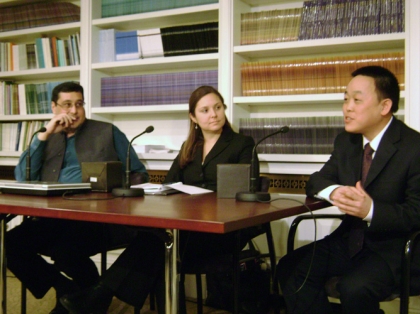Experts Discuss the Future Energy & Environment in China

On March 6th, 2009, the Frederick S. Pardee Center for the Study of the Longer-Range Future held a seminar on ‘Energy and Environment: How is China Responding’. The seminar was part of the Pardee Center’s ongoing discussion on the future of China following the conference on China’s future held last December.
The seminar featured a presentation by Dr. Joanna Lewis of Georgetown University followed by a commentary by Dr. Xiaowei Xuan from Harvard University. The discussion focused on the longer-range implications of China’s response to energy and environment challenges – not only for China itself but for the region and the world.
Joanna Lewis, assistant professor of Science, Technology and International Affairs (STIA) at Georgetown University, focuses her research on renewable energy industry and policy development, mechanisms for low-carbon technology transfer in the developing world, and expanding options for multilateral engagement in a post-2012 international climate change agreement.
Lewis presented recent statistics showng that China has seen eight to 10 percent growth a year, lifted approximately 400 million people out of poverty, and has become three times more energy efficient over the past three decades. Yet, the challenges it faces are varied, including air pollution, water pollution, land degradation and desertification, coal reliance, and large emissions of green house gases. She noted that although China has the strictest regulations of sulfur dioxide emissions from power plants, these standards are not met because of disincentives and frequent power shortages. In addition to poor air quality China also has major water quality issues, with 70 percent of the country’s water undrinkable and 20 percent lost to inefficiencies in water supply systems. In addition, desertification in China is being exacerbated by climate change, and 400 million people are threatened by it.
Additionally, China is now the largest annual emitter of greenhouse gases. Though its per capita emissions are only one-quarter that of the US, and its cumulative emissions [in the past decade] are well below that of the US.
Lewis also stressed that industry is what drives most of China’s energy consumption, whereas in the US transportation plays a larger role in energy consumption. Although these statistics seem grim, she pointed out that China has also begun diversify its energy source away from coal, as a product of the National Renewable Energy Law (2005), but it still has a long way to go. For example, China uses more solar hot water technology then all the other nations combined. Lewis believes that energy pressures will guide policies and that any international pressure is unlikely to make any reforms.
Dr. Xiaowei Xuan, a visiting scholar at Harvard University, conducts research on energy and environmental policy in the Department of Development Strategy and Regional Economy, in the Development Research Center of the State Council, China. He holds a Ph.D. from the Guanghua School of Management at Peking University.
One of Dr. Xuan’s main points was on the role the local government plays on energy consumption. He pointed out that in China, the local leadership is evaluated by local GDP as well as by the local energy intensity. Xuan believes that changes in the assessment of local leaders, an enhanced central government with a better bureau of energy administrators, and an improvement of local residents’ rights would help remove some of the pressure from local governments to resort to massive industry.
More interestingly, Xuan, along with Lewis, believe that the leadership in China has the will to make some reforms but lacks the capacity. To change this, Xuan believes that the government needs to build its capacity and needs to invest more in research.
The presentations were followed by a lively Q&A session moderated by Pardee Center Director, Prof. Adil Najam.